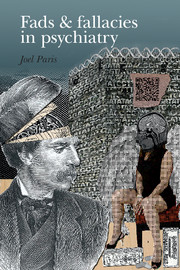10 - Evidence-based psychiatry
from Part III - Antidotes
Published online by Cambridge University Press: 01 January 2018
Summary
The experience of being the editor of the Canadian Journal of Psychiatry taught me a great deal about what to believe or what not to believe about medical research. We do not accept articles based mostly on opinion, and routinely turn down submissions which draw conclusions from small samples or lack a control group. I suspect some of our readers find our standards too high, and the prose of the articles we publish a little dry. But raising the bar is one way of encouraging the practice of psychiatry on the basis of evidence.
Evidence-based medicine is a movement in its own right, and it has greatly influenced the way medicine is practised (Evidence-Based Medicine Working Group, 1992). It has been closely associated with two universities, Oxford University in the UK and McMaster University in Canada. The concept of evidence-based medicine was originated by a pioneering British physician, Archibald Cochrane, whose name lives on in a series of authoritative (and famously sceptical) ‘Cochrane reports’ on the efficacy of medical treatments. Those of us who follow Cochrane are often surprised to see just how little medical science knows.
Evidence-based medicine rests on a simple but powerful idea. An editorial in the BMJ (Sackett et al, 1996) described it as ‘the conscientious, explicit, and judicious use of current best evidence in making decisions about the care of individual patients. The practice of evidence-based medicine means integrating individual clinical expertise with the best available external clinical evidence from systematic research.’
These principles can be applied to mental health practice. In a major cultural shift, evidence-based psychiatry has become a force to reckon with (Geddes ' Carney, 2001). The influence of evidence-based medicine is apparent in the changed content of all psychiatric journals. It is sobering to read their contents from 40 years ago. Even the top journals were full of case reports, case series and unsupported clinical opinions. Such articles are now rarely, if ever, published. Instead, the pages of medical journals are filled with quantitative studies that test hypotheses, as well as systematic reviews and/or meta-analyses. It is no longer sufficient to have clinical experience. You have to present empirical data.
- Type
- Chapter
- Information
- Fads and Fallacies in Psychiatry , pp. 97 - 102Publisher: Royal College of PsychiatristsPrint publication year: 2013



